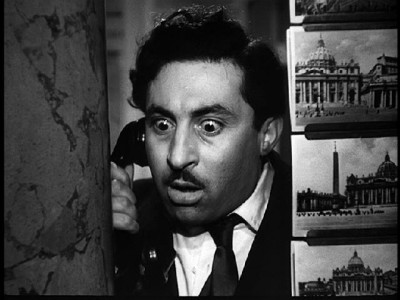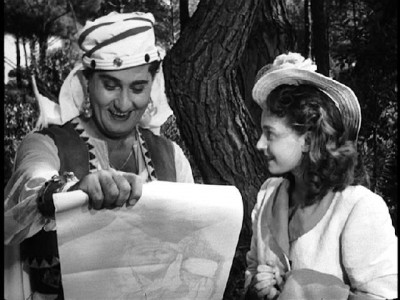
The first thing that Federico Fellini’s first solo directorial effort The White Sheik (1952) is apt to remind modern viewers of is one of the segments in Woody Allen’s To Rome with Love (2012). And with good reason, since Allen’s story about the newlyweds from the provinces coming to Rome, getting separated, and ending up involved with a movie star and a prostitute is obviously drawn from this film—with quite a few Allenesque embellishments added. But there’s a lot more to The White Sheik than the fact that it inspired part of a Woody Allen picture (not that that’s a bad thing). Though it’s often dismissed as lightweight Fellini—or even as un-Fellini-esque Fellini—The White Sheik touches on—if only in embryonic form—so many key Fellini preoccupations that it really couldn’t be anyone else’s movie.

Yes, the story is a simple one. Slightly stuffy, self-important provincial boob Ivan Cavalli (Leopoldo Trieste) and his extremely innocent new wife Wanda (Brunella Bovo) have come to Rome for a two day honeymoon—a honeymoon Ivan has scheduled to death and which he views as a means of impressing his “well-connected” uncle (Ettore Maria Margadonna). What Ivan doesn’t know is that Wanda has a little—innocent—sidetrip of her own in mind. She wants to meet her idol, Fernando Rivolli (Alberto Sordi), who Wanda knows only as The White Sheik, the character he portrays in the fumetti (a comic book with photos rather than drawings) she’s addicted to. Furthermore, she has a letter telling her (in her fantasy incarnation as “Passionate Dolly”) to drop by the magazine offices when she’s in Rome. Sneaking out of the hotel for what she thinks will be a few minutes, Wanda soon finds herself dragged off an a photo shoot without a hope of returning to the hotel before Ivan finds her missing. While Wanda has her adventure, an increasingly distraught Ivan struggles to keep her absence from his family. It’s pure farce and Fellini plays it as such—albeit with surprisingly touching moments.

Unsurprisingly, The White Sheik—who Wanda meets in a totally fantasticated manner with him in an impossibly high swing suspended between two trees—is a totally self-absorbed jerk. (Really, what do you expect from a guy who spends his time dressed in cheesy costumes “acting” out childish adventure stories?) He’s also a womanizer with a battleship of a wife (not quite one of Fellini’s grotestques, but on her way) waiting in the wings. While Rivolli is more than happy to romance Wanda, he’s also willing to dump her in a heartbeat when she becomes inconvenient. In the meantime, Ivan is running low on excuses and becoming despondent. But this is first and foremost a comedy, so there’s never much doubt that it won’t all work out.

Along the way to that inevitable happy ending, however, we have the heart-broken Ivan’s innocent encounter with a friendly prostitute named Cabiria (Giulietta Masina), who five years later will get a film all her own. There’s also a bizarre trip to an insane asylum (where Wanda is put after an absurd suicide bid), a fire-eater, a marching band, a papal audience, and various peculiar characters. Then too, we had the playfully surreal business of The White Sheik in that swing—not to mention his improbable superhero-like descent to meet Wanda—and the whole odd business of a young woman being romanced in a seaside dive by a man dressed in a sheik costume. How all this elements can be viewed as anything other the Fellini-esque is beyond me. In fact, The White Sheik seems quite ahead of its time—less suggesting the films that immediately follow it than Fellini’s later, more fanciful works of his mature (post 1960) era,
The Asheville Film Society will screen The White Sheik Tuesday, April 1, at 8 p.m. in Theater Six at The Carolina Asheville and will be hosted by Xpress movie critics Ken Hanke and Justin Souther.




Before you comment
The comments section is here to provide a platform for civil dialogue on the issues we face together as a local community. Xpress is committed to offering this platform for all voices, but when the tone of the discussion gets nasty or strays off topic, we believe many people choose not to participate. Xpress editors are determined to moderate comments to ensure a constructive interchange is maintained. All comments judged not to be in keeping with the spirit of civil discourse will be removed and repeat violators will be banned. See here for our terms of service. Thank you for being part of this effort to promote respectful discussion.